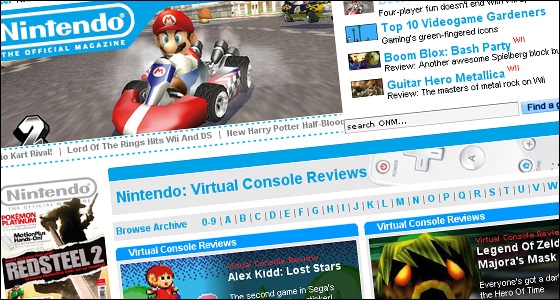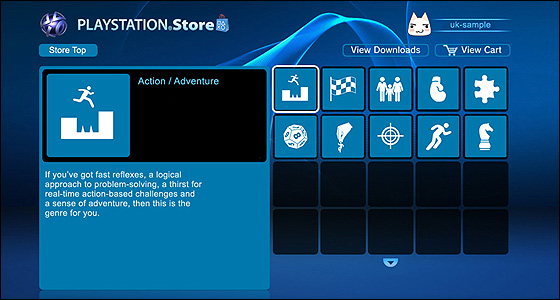Microtransactions: More Mindless Razzing on Print Media and Complaints About Modernization
June 4th, 2009
Those Guys Aren’t So Interesting
Last week I bought a new-but-probably-old-by-now copy of the Australian Official Nintendo Magazine. I bought it on the grounds that it discusses upcoming WiiWare and DSiWare games in a professional context. The services features a bunch of games that interest me such as Lit, New Adventure Island, Gradius Rebirth, Contra Rebirth etc. and yet the online coverage of these two services is weak. I think it’s an issue with the crediting system for press access to free games, an error on Nintendo’s part unfortunately.
I also bought to magazine to rank it against the grandfather of official Nintendo print; NMS. Just briefly; it’s head and shoulders above NMS. Respectable magazine, great visual layout, quality writing and they use their biggest asset (being related to Nintendo) to their advantage with great art assets and exclusive material. Although, the magazine appears to be iterative of the UK version. Hmm..
Anyways, in the reader mail was a response regarding a petty dispute over some score the magazine had previously assigned, the kid said it should have been a 93% and not a 90%. Big deal. It made me think though, why would anyone ever email into a writer of a magazine or website? I mean, most video game websites and magazines command a stringent diet of news, reviews and previews with the occasional feature. The three modes of writing don’t open themselves for discussion since they don’t really present an argument. That is, you can’t email a writer to debate over a news or previews piece because such content is usually above the reader’s point of access. If anything the reader might request the writer to drawn on their insight to offer an opinion, but really there is little argument one can make over news and previews. Reviews are often equally bland affairs of dolled out lists of features, so while there should be, there isn’t really an argument for readers to respond here either. The big three modes of operation could (and should) take sides, show opinions and make an argument, but due to the culture of the games writing media, it kinda hasn’t worked out that way – which is why you’re read me, rite? ^_^
I know that readers don’t always email in with questions regarding opinion. As previously suggested, they may simply wish to draw on the writer’s insight into the industry or share a few compliments. But I wonder, besides the love letters, requests for insight and quibbles over spelling errors, why would one ever need to email these publication in the reader email section?

What about the emails already featured in the reader mail section? Good point! It didn’t take me much backtracking to remind myself why I usually avoid reading the dull community discussion. Most of the published letters (this applies for all print magazines I’ve read) are silly anecdotes that end with a magazine-promoting moral to boast the brand of the copy. Other emails are bouts of obvious stupidity, with readers asking whether X company is working on X dream game. Funnily enough, all email responses, even the remarkably positive ones are always met with a pessimistic sentence or two where the magazine staffer breathes snark at reader. Quite disgusting actually.
The reverse of this is what we have here on the internet, and I think of my articles at GameSetWatch as a case in point. GameSetWatch has as much weight as any good print mag, in fact the company have their own print magazine, but nevermind. So I write an article or two for the site and it’s discussed in the comments both there and a little here at my site. I receive an email or two by people who have particular responses to the article. I then cross to someone else’s blog who has written an article to make me out as a racist, and we debate the article for a few days there. Two American blokes also do a 30 minute podcast where they too discuss one of my articles, and then email me for feedback. I don’t mean to denigrate print or promote my gear, print is wonderful – I just paid a good deal of money for the latest two Gamespite volumes (they shipped today!) – but as was the message in my article about Hyper, print folks that aren’t progressive in their adoption of new media will simply fall behind. The web and blogs in particular are shaping games discussion as the community sees fit, wouldn’t hurt to see print attempting to be a little more bold.
ONM appears to be adopting new media well, like other Future products they have a website and forum, and the magazine integrates the two a little. Sort of like the old TotalGames.net site.
Discredited
Continuing on from this point. I was talking with someone the other day, and I said to them that I find all Australian game writers to be this white-wash of sameness. I can’t decipher who is who as they all seem to post the same neutral tone copy with an excess of forced Australian-ness.
After my damning comments, I later realized that I think this way for two reasons; firstly in some print magazines, writers are not credited for their individual pieces. The second reason is a fault of the games media and yes, yes, I know that whole news-reviews-reviews system. None of it seems open enough to allow writers to develop their own distinct writing style, not do the writers seem interested in personalizing their content. In fact, that’s one of the biggest issues with games writing, is that you can’t tell people apart!
Too Modern for a Traditionalist
Something I like about being a gamer, is how the medium accommodates players who wish to play games on any part of the social continuum. For example, I can player a single player game by myself, I can play with a faceless team mate on the otherside of the world, or I can play with a bunch of mates sharing a couch. I prefer to play single player experiences and occasionally with several mates in the same area. Predominately speaking though most of my game experiences are single player affairs and that’s how I like it.

Like any good man, playing games is my time of respite, my time to relax in my own world. I’ve been playing like this forever, but in the past few months I’ve grown to loathe online play and for no real justifiable reason. When I load up the Playstation 3 it automatically signs me into the Playstation Network, fair enough. The same goes for when I use my brother’s computer with the Steam service.
I find that during my time of relaxation the online integration elements bother me, significantly. I don’t like the Playstation 3 overlaying alerts of a friend signing on or the weak wireless reception in my room. The same applies for the request I get to play Team Fortress 2 when using my brother’s ID on Steam. Obviously I can switch these devices off, but that isn’t my case here. My point is that I play games to get away from socializing and all that stuff, and these features constrict that. I accept that this is a modern reality because the integration is simply great and many players choose to respond to the alerts, but I’m personally less willing. I think it’ll be sometime before I change my mind. I guess I’m caught in the rift called ‘modernization’.
Portals, Goffman, Language and Performance
June 3rd, 2009
My latest Lingua Franca column is now up on GameSetWatch and probably Gamasutra too, if habits prevail. I rarely talk myself up, but I’m very proud of this piece. It’s been stewing away since last November and finally I’ve had the opportunity to apply myself with it. This time around I discuss Portal and the way the tale represents the management of social performance through language. It’s a critique, and worthy of that illusionary word as my methodology combines the sociology studies of Erving Goffman with concepts from the linguistics discipline as well as game narrative. It’s pretty heavy stuff and spans out to a massive 5600 words. The larger chunk of that preposterous amount of text is pure analysis.
I prepped up pretty good for this article. I’ve been studying Goffman’s work for a while now, but I decided to read The Presentation of Self in Everyday Life just in case. I’ll be onto his other works later on sometime. I also went through some old lecture slides from Uni and dug out a few quotes by people like Bourdieu and Foucault that are relevant to the article. I hope to eventually read more of what they have to say too. Here are two of my favourite quotes, worth reading before you approach the essay:
“Language is a guide to “social reality”… it powerfully conditions all our thinking about social problems and processes. Human beings do not live in the objective world alone, nor alone in the world of social activity as ordinarily understood, but are very much at the mercy of the particular language which has become the medium of expression for their society. It is quite an illusion to imagine that one adjusts to reality essentially without the use of language and that language is merely an additional means of solving specific problems of communication or reflection. The fact of the matter is that the “real world” is to a large extent unconsciously built upon the language habits of the group. No two languages are ever sufficiently similar to be considered as representing the same social reality. The worlds in which different societies live are distinct worlds, not merely the same world with different labels attached to…. We see and hear and otherwise experience very largely as we do because the language habits of our community predispose certain choices of interpretation.” (Sapir 1962).
“Institutions are powerful to the extent that people have come to interpret them as ‘the way things are (and should be) done’. There are likely to be sanctions for people who deviate from or are unable to interpret what is normal” (Bourdieu 1991)




 Game Design Companion: A Critical Analysis of Wario Land 4 - $7.99
Game Design Companion: A Critical Analysis of Wario Land 4 - $7.99 Level Design: Processes and Experiences
Level Design: Processes and Experiences Speed Boost: The Hidden Secrets Behind Arcade Racing Design - $5.99
Speed Boost: The Hidden Secrets Behind Arcade Racing Design - $5.99 Adventures in Games Analysis: Volume I - $5.99
Adventures in Games Analysis: Volume I - $5.99







